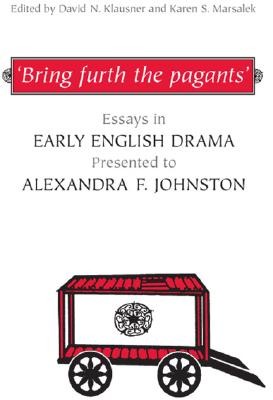
- We will send in 10–14 business days.
- Publisher: University of Toronto Press
- ISBN-10: 0802091075
- ISBN-13: 9780802091079
- Format: 16.1 x 23 x 2.7 cm, hardcover
- Language: English
- SAVE -10% with code: EXTRA
'Bring Furth the Pagants' (e-book) (used book) | bookbook.eu
Reviews
Description
Written to honour the distinguished work and career of Alexandra F. Johnston, 'Bring furth the pagants' brings together original essays in early English drama by colleagues and students of the founder and director of the Records of Early English Drama Project.
Editors David N. Klausner and Karen Sawyer Marsalek have grouped the contributions into three primary areas of Johnston's research: the study of documentary records in relation to drama, including new research on the York documents; the interpretation of early English drama, focusing both on the biblical plays and also on the moral interludes, including a broad survey of the role of the Expositor figure in English and French plays; and the drama of the later sixteenth and seventeenth centuries (Marlowe and Shakespeare) from the standpoint of its medieval background.
Diverse, thought-provoking, and original, this collection acts as an important complement to the REED volumes and provides a fitting tribute to the scholar it honours.
EXTRA 10 % discount with code: EXTRA
The promotion ends in 16d.05:39:26
The discount code is valid when purchasing from 10 €. Discounts do not stack.
- Publisher: University of Toronto Press
- ISBN-10: 0802091075
- ISBN-13: 9780802091079
- Format: 16.1 x 23 x 2.7 cm, hardcover
- Language: English English
Written to honour the distinguished work and career of Alexandra F. Johnston, 'Bring furth the pagants' brings together original essays in early English drama by colleagues and students of the founder and director of the Records of Early English Drama Project.
Editors David N. Klausner and Karen Sawyer Marsalek have grouped the contributions into three primary areas of Johnston's research: the study of documentary records in relation to drama, including new research on the York documents; the interpretation of early English drama, focusing both on the biblical plays and also on the moral interludes, including a broad survey of the role of the Expositor figure in English and French plays; and the drama of the later sixteenth and seventeenth centuries (Marlowe and Shakespeare) from the standpoint of its medieval background.
Diverse, thought-provoking, and original, this collection acts as an important complement to the REED volumes and provides a fitting tribute to the scholar it honours.


Reviews